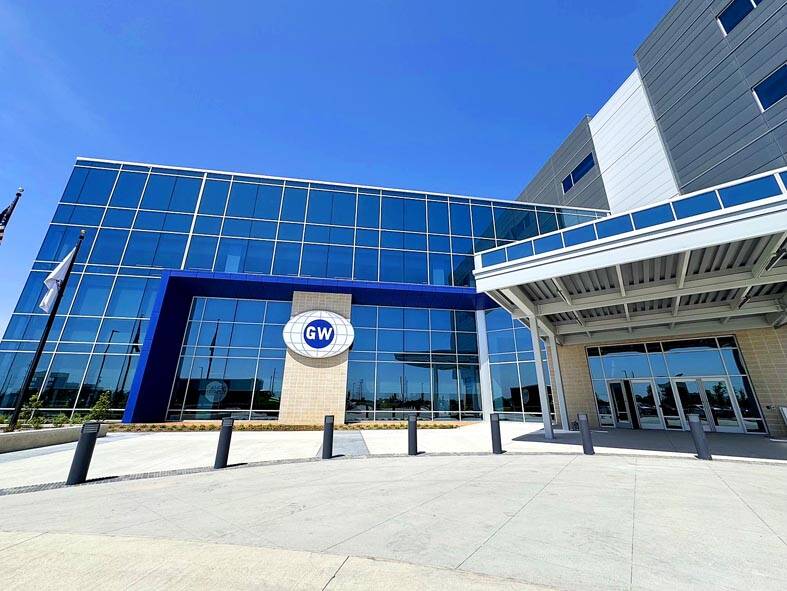GlobalWafers Co (環球晶圓), the world’s No. 3 silicon wafer supplier, yesterday said it has formed a new partnership with Apple Inc to supply 300mm silicon wafers from its new factories in the US as Apple accelerates its efforts to boost the US semiconductor manufacturing supply chain.
The announcement followed Apple’s pledge of US$100 billion in new investments in the US over the next four years, dedicated to bringing more of Apple’s supply chain and advanced manufacturing to the country. That raised Apple’s total US investment to US$600 billion.
Apple is partnering with GlobalWafers America (GWA), a US subsidiary of GlobalWafers, in Sherman, Texas, to produce advanced wafers for use in US-based semiconductor fabs for the first time.

Photo courtesy of GlobalWafers Co
Taiwan Semiconductor Manufacturing Co’s (台積電) fabs in Phoenix, Arizona, and Texas Instruments Inc’s fabs in Sherman would use GWA’s 300mm wafers to produce chips for iPhones and iPads sold in the US and around the world, Apple said.
“Over the past 30 years advanced silicon wafer production all but left America for lower-cost manufacturing hubs. Our new partnership with Apple, America’s most important end-user of silicon, is a powerful market signal that the entire semiconductor supply chain is now back in the US in full force,” GlobalWafers president Mark England said in a statement.
GlobalWafers’ new wafer manufacturing facilities in Texas would be eligible for an advanced manufacturing investment tax credit of up to 35 percent, the statement said.
The firm is the only manufacturer of advanced 300mm wafers to participate in US President Donald Trump’s “CHIPS for America” program.
Shares in GlobalWafers surged 9.97 percent yesterday to NT$375 following the announcement.
GlobalWafers in May said it planned to invest US$4 billion in advanced 300mm wafers in Sherman. The new investment commitment would bring the firm’s total investment in the US to US$7.5 billion.
GlobalWafers earlier this week said that the company would consider bringing forward the next phase of capacity expansion in the US based on the demand profile of its US customers.
The company’s first new plant in Texas is scheduled to begin high-volume production in the second half of this year, it said.

IN THE AIR: While most companies said they were committed to North American operations, some added that production and costs would depend on the outcome of a US trade probe Leading local contract electronics makers Wistron Corp (緯創), Quanta Computer Inc (廣達), Inventec Corp (英業達) and Compal Electronics Inc (仁寶) are to maintain their North American expansion plans, despite Washington’s 20 percent tariff on Taiwanese goods. Wistron said it has long maintained a presence in the US, while distributing production across Taiwan, North America, Southeast Asia and Europe. The company is in talks with customers to align capacity with their site preferences, a company official told the Taipei Times by telephone on Friday. The company is still in talks with clients over who would bear the tariff costs, with the outcome pending further

NEGOTIATIONS: Semiconductors play an outsized role in Taiwan’s industrial and economic development and are a major driver of the Taiwan-US trade imbalance With US President Donald Trump threatening to impose tariffs on semiconductors, Taiwan is expected to face a significant challenge, as information and communications technology (ICT) products account for more than 70 percent of its exports to the US, Chung-Hua Institution for Economic Research (CIER, 中華經濟研究院) president Lien Hsien-ming (連賢明) said on Friday. Compared with other countries, semiconductors play a disproportionately large role in Taiwan’s industrial and economic development, Lien said. As the sixth-largest contributor to the US trade deficit, Taiwan recorded a US$73.9 billion trade surplus with the US last year — up from US$47.8 billion in 2023 — driven by strong

A proposed 100 percent tariff on chip imports announced by US President Donald Trump could shift more of Taiwan’s semiconductor production overseas, a Taiwan Institute of Economic Research (TIER) researcher said yesterday. Trump’s tariff policy will accelerate the global semiconductor industry’s pace to establish roots in the US, leading to higher supply chain costs and ultimately raising prices of consumer electronics and creating uncertainty for future market demand, Arisa Liu (劉佩真) at the institute’s Taiwan Industry Economics Database said in a telephone interview. Trump’s move signals his intention to "restore the glory of the US semiconductor industry," Liu noted, saying that

AI: Softbank’s stake increases in Nvidia and TSMC reflect Masayoshi Son’s effort to gain a foothold in key nodes of the AI value chain, from chip design to data infrastructure Softbank Group Corp is building up stakes in Nvidia Corp and Taiwan Semiconductor Manufacturing Co (TSMC, 台積電), the latest reflection of founder Masayoshi Son’s focus on the tools and hardware underpinning artificial intelligence (AI). The Japanese technology investor raised its stake in Nvidia to about US$3 billion by the end of March, up from US$1 billion in the prior quarter, regulatory filings showed. It bought about US$330 million worth of TSMC shares and US$170 million in Oracle Corp, they showed. Softbank’s signature Vision Fund has also monetized almost US$2 billion of public and private assets in the first half of this year,